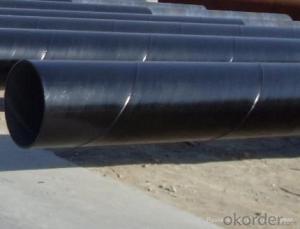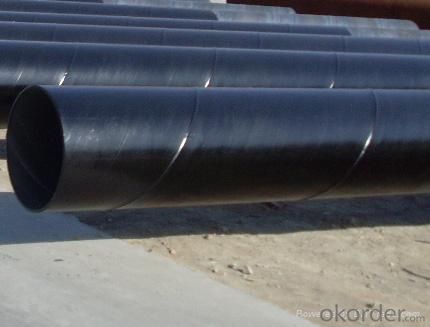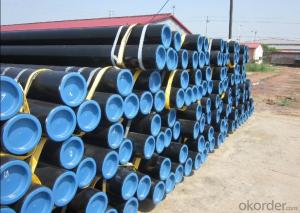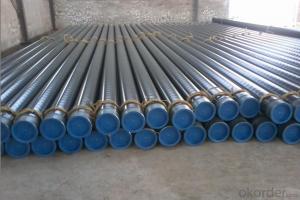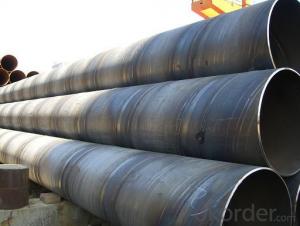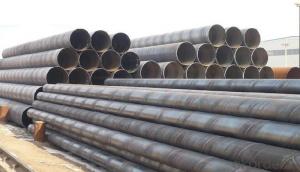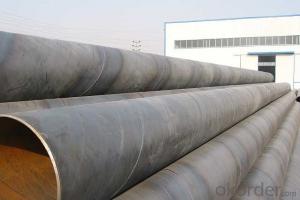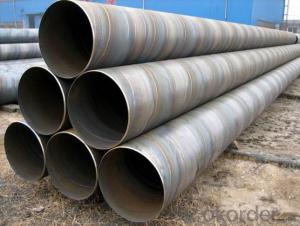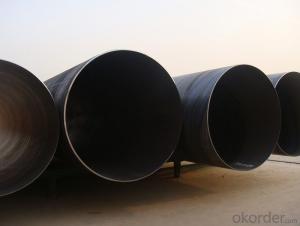SPIRAL STEEL PIPE 46’‘48‘‘50’‘ LARGE DIAMETER PIPE
- Loading Port:
- Tianjin
- Payment Terms:
- TT OR LC
- Min Order Qty:
- 5 m.t.
- Supply Capability:
- 3000 m.t./month
OKorder Service Pledge
OKorder Financial Service
You Might Also Like
Packaging & Delivery
Packaging Detail: | standard export packing or as customer's requirement |
Delivery Detail: | within 10 - 30 days |
Specifications
Spiral Welded Steel Pipes and Tubes
1.Material:Q195-Q235
2.Length:1-12m
3.WT:1.0-14mm
4.O.D.:20-273mm
Spiral Welded Steel Pipes and Tubes
Product Description:
1.Material : Q235,Q345,L245,L290,L360,L415,L450,L485,GrB,X42,46,X52,X56,X60,X65,X70,X80,X100
2,Standard: SY/T5037-2000,GB/T9711-2011,API Spec 5L PSL1/PSL2,ASTM A252\A53,ISO3183,DIN17172,EN10217,JIS G3457,AWWA C200,ASTM A139,ASTM A671,ASTM A672
3.Wall thickness: 3.0mm-30mm
4.Outer diameter: φ168mm-3020mm
5,Length: 5m-12m or as your requirement
6,Corrosion protection standard: DIN30670,DIN30671, AWWAC210, AWWA C203, SY/T0413-2002,SY/T0414-2002
7,Application: Oil, gas, natural gas, water pipe, thermal electricity pipe, steel structure engineering, etc
Q195-q345 Material Steel Pipe's Materials
Elements | Chemical Compsition% | Mechanical Property | ||||||
C% | Mn% | S% | P% | Si% | Yield Point (Mpa) | Tensile Strength(Mpa) | Elongation | |
Q195 | 0.06-0.12 | 0.25-0.50 | <0.050< span=""> | <0.045< span=""> | <0.030< span=""> | >195 | 315-430 | 32-33 |
Q215 | 0.09-0.15 | 0.25-0.55 | <0.05< span=""> | <0.045< span=""> | <0.030< span=""> | >215 | 335-450 | 26-31 |
Q235 | 0.12-0.20 | 0.30-0.70 | <0.045< span=""> | <0.045< span=""> | <0.030< span=""> | >235 | 375-500 | 24-26 |
Q345 | <0.20< span=""> | 1.0-1.6 | <0.040< span=""> | <0.040< span=""> | <0.55< span=""> | >345 | 470-630 | 21-22 |
- Q: What are the different types of steel coatings used for pipes?
- Some of the different types of steel coatings used for pipes include epoxy coatings, polyethylene coatings, fusion bonded epoxy (FBE) coatings, and zinc coatings.
- Q: How are steel pipes used in wastewater treatment?
- Steel pipes are commonly used in wastewater treatment to transport and distribute the wastewater throughout the treatment facility. They are used for various purposes such as carrying raw sewage, transporting treated water, and distributing chemicals for the treatment process. Steel pipes are preferred due to their strength, durability, and resistance to corrosion, making them suitable for handling the harsh and corrosive nature of wastewater.
- Q: What is the difference between black steel pipes and galvanized steel pipes?
- Black steel pipes and galvanized steel pipes differ in their coating. Black steel pipes are uncoated and have a dark, matte appearance, while galvanized steel pipes are coated with a layer of zinc to prevent corrosion. The galvanization process provides added protection and durability, making galvanized steel pipes suitable for outdoor or high-moisture environments.
- Q: Are steel pipes suitable for underground chemical transport?
- Steel pipes are widely regarded as appropriate for transporting chemicals underground because of their high strength and durability. They have the ability to endure the pressure and weight of the soil above, rendering them impervious to harm or collapse. Furthermore, steel pipes possess corrosion resistance, which is vital when conveying chemicals that might react with or corrode other substances. They also have the capability to handle a wide range of temperatures, making them suitable for transporting chemicals that necessitate specific temperature conditions. Nevertheless, it is crucial to carefully consider the particular chemical being transported and seek advice from experts in chemical engineering or pipeline design to guarantee the compatibility of the steel pipes with the chemical and the implementation of any necessary safety precautions.
- Q: Can steel pipes be used for hydronic heating systems?
- Yes, steel pipes can be used for hydronic heating systems. Steel pipes are commonly used in hydronic heating systems due to their durability, high temperature resistance, and ability to handle high pressure. They are suitable for both residential and commercial applications and can efficiently transport hot water or steam throughout the system.
- Q: Can steel pipes be used for underground oil and gas pipelines?
- Yes, steel pipes can be used for underground oil and gas pipelines. Steel is a widely used material in the oil and gas industry due to its strength, durability, and resistance to corrosion. Steel pipes are capable of withstanding the high pressure and extreme conditions often encountered in underground pipelines, making them a reliable choice for transporting oil and gas.
- Q: What are the different types of steel pipe bends?
- There are three main types of steel pipe bends: 90-degree bends, 45-degree bends, and 180-degree bends. These bends are commonly used in piping systems to redirect the flow of fluids or gases in a desired direction.
- Q: Can steel pipes be used for underground power transmission?
- Yes, steel pipes can be used for underground power transmission. Steel pipes are commonly used for underground power transmission due to their durability, strength, and resistance to corrosion. They provide a reliable and secure conduit for transmitting power underground while protecting the electrical cables from external elements.
- Q: Can steel pipes be used for transporting chemicals?
- Yes, steel pipes can be used for transporting chemicals. Steel pipes are known for their strength and durability, making them suitable for various applications, including the transportation of chemicals. Additionally, steel pipes are resistant to corrosion, which is crucial when dealing with potentially corrosive substances. However, it is important to ensure that the specific type of steel used in the pipes is compatible with the chemicals being transported to prevent any reactions or contamination.
- Q: Are steel pipes suitable for potable water systems?
- Yes, steel pipes are suitable for potable water systems. Steel pipes are commonly used in potable water systems due to their strength, durability, and resistance to corrosion. They can withstand high pressure and are able to carry large volumes of water. Additionally, steel pipes can be easily welded together, making them a versatile choice for various applications in potable water systems. However, it is important to note that proper maintenance and regular inspections are necessary to prevent any potential issues such as rust or contamination.
Send your message to us
SPIRAL STEEL PIPE 46’‘48‘‘50’‘ LARGE DIAMETER PIPE
- Loading Port:
- Tianjin
- Payment Terms:
- TT OR LC
- Min Order Qty:
- 5 m.t.
- Supply Capability:
- 3000 m.t./month
OKorder Service Pledge
OKorder Financial Service
Similar products
Hot products
Hot Searches
Related keywords
